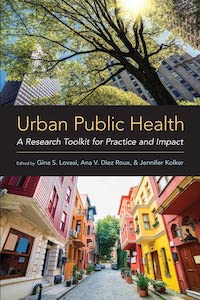Why I Did Not Use AI to Write This Introduction
Posted on
September 21, 2023
By Interim Dean Gina Lovasi, PhD, MPH
 I am honored to be stepping up to the role of Interim Dean for the Dornsife School of Public Health at a moment when new questions are being raised about how technology affects the educational experiences we can and should offer. While my faculty bio, along with others on our leadership team, can be found here, I wanted to reflect on options for writing an introduction like this before sharing a few things I would like to highlight about myself.
I am honored to be stepping up to the role of Interim Dean for the Dornsife School of Public Health at a moment when new questions are being raised about how technology affects the educational experiences we can and should offer. While my faculty bio, along with others on our leadership team, can be found here, I wanted to reflect on options for writing an introduction like this before sharing a few things I would like to highlight about myself.
A case for writing in a time of free tools for artificial intelligence text generation. I’ve been drawn to reading about the promise and peril of generative artificial intelligence in the classroom and in our professional lives since my first experiences testing out tools like ChatGPT.
During my time as Associate Dean for Education, academic integrity violations involving artificial intelligence started to emerge, leading to conversations in which the initialism “AI” became ambiguous. For now, instructors have been detecting such violations during grading due to writing style or flaws in the tools used (e.g., fabricated references). However, such flaws will likely become less pervasive as the technology improves. Such flaws may initially be overcome only within more advanced tools behind a paywall, adding the potential for unequal access to the mix. Ultimately, it seems to me that our allowance of AI in the classroom should be informed by when such tools can be used in our students’ future professional lives.
So, in thinking about this first contribution to the Dean’s Monthly Newsletter introducing myself, I wondered if such writing should be expedited through generative AI tools. I think there are at least 3 reasons why not:
1) Accountability – errors and biases in my writing originate as my own, not the amalgamation of prior writings. Text generated by AI also frequently contains errors, and may embed biases that are evident in prior writings and then used to predict which words go together.
As much as I endeavor to keep accuracy in mind, my goal is progress rather than perfection. Factual errors or omissions may arise, and I’m counting on our community to point them out when they do. If these errors are mine, I can own up and apologize, rather than evading responsibility through pointing to the tools I used. And in the process I can continue to seek training and support to inform awareness of explicit or implicit biases, in alignment with our school’s Action Plan to Enhance Diversity, Inclusion, Equity, and Antiracism. I’m looking to cultivate accountability, integrity, and authenticity in myself and our school. Thus, these words are my own.
2) Recency – unlike large language models that have a cutoff date and may rely on older sources such as this Wikipedia entry, I work to stay aware of and influenced in my writing by recent events. Just last month, a hurricane and earthquake simultaneously affected Southern California just after I ended a visit there. This convergence of natural disasters affecting the area where I grew up and where much of my extended family still resides, felt to me like it captured a sense of layered vulnerability and loss which has become familiar in recent years. In early September, excess heat cut short the first days of the school year in Philadelphia, even as clean-up and grief continued from the Lahaina fire on Maui. Tragically, I started this draft at the beginning of the month knowing that there would be time to add updates, and indeed hurricane season continues and earthquake shook Morrocco, both with loss of life and damage to homes and communities. Global conflicts (including those catalogued here, albeit with a lens focused on U.S. impact) and violence continue to cause grief and outrage.
We seem to be watching together as momentous historical events unfold in real time. Writing is an opportunity to process what we are witnessing, yet staying open to inputs can be painful and anticipating the perspective of others given what they have experienced is complex. Communicating effectively as a leader is perhaps always challenging, but feels more so given a view of recent events in the world and in each others lives that is never complete. The only solution I can see to the inherent risks of seeming out of touch or callous to rekindling trauma is to make communication bidirectional, with people engaged in the process together.
3) Reflection – while a well-crafted prompt can be used to generate text that is grammatically correct and easy to read, expedited text generation overlooks the value of taking time to clarify our intentions and make sense of our experiences.
As there are many articles available about interim dean roles, an AI-written compilation of why people take on such a role could be generated, and would probably sound sufficiently convincing. But after reflection, here is my reason: I love the spirit of intertwined inquiry and service that brings people to public health, and to Dornsife School of Public Health in particular. I am here to provide continuity, to keep us looking forward, to remind us of our strengths and our responsibilities.
So, what do I want you to know about me? Just 5 things:
- I am interested in urban health, and co-edited a book while serving as Co-Director of our Urban Health Collaborative to share what we were learning about foundational knowledge, promising research tools and examples, and needed partnership and communication skills.
- My teaching at Drexel in recent years included Introduction to Epidemiology, Healthy Housing and Built Environment, and Urban Health Integrative Learning Experience Capstone. This Fall, I’m teaching Introduction to Public Health, and I continue to co-direct a training grant for doctoral and postdoctoral health equity researchers.
- In my research, I lead a project entitled Communities Designed to Support Cardiovascular Health for Older Adults which was funded by the National Institute for Aging and renewed in 2022. I also have collaborative roles as a co-investigator or leading subcontracts for studies of place and health, and I am waiting to hear back about a grant proposal submitted the day before I started as Interim Dean.
- My publications explore how food stores, walkable streets, greenspaces, and local policy initiatives connect to chronic disease and health equity, among other topics.
- I am here to learn and to serve, and I know I’m in good company.